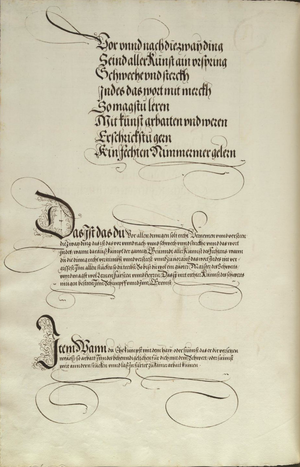|
|
You are not currently logged in. Are you accessing the unsecure (http) portal? Click here to switch to the secure portal. |
User:Kendra Brown/Latin Lew/Piece 009
Jump to navigation
Jump to search
Contents
Dresden
German
Transcription
[2] Item Wann du Ehe kumpst mit dem haw / oder sunnst das er dir versetzen muosz / so arbait Inndes behenndigelichen für dich mit dem Schwert / oder sunnst mit anndern stücken. vnnd lasz In furter zu kainer arbait kumen.
Sandbox German
- Item Wann du Ehe kumpst mit dem haw,
- oder sunnst das er dir versetzen muoß,
- so arbait Inndes behenndigelichen fur dich mit dem Schwert,
- oder sunnst mit anndern stucken,
- vnnd laß In furter zu kainer arbait kumen.
English
Sandbox English from German
- Item. When you arrive in the Before with the cut,
- or anything else, so that they have to counteract,
- then quickly work INDES in front of youself with the sword,
- or with any other sequences,
- and do not allow them to arrive at any further work.
Smooth English from German
Item. When you arrive in the Before with the cut, or anything else, so that they have to counteract, then quickly work INDES in front of youself with the sword, or work any other sequences, and do not allow them to arrive at any further work.
Munich
Latin
Transcription
[5] quo hostem feriundo praevenias, id si feceris, omnes habitus quos exercere voles, contra eum continuo usurpato. Ut is cogatur subinde se defendere.
Sandbox Latin
- ut observes, quo hostem feriundo praevenias,
- id si feceris,
- omnes habitus quos exercere voles,
- contra eum continuo usurpato.
- Ut is cogatur subinde se defendere[1].
English
Sandbox English from Latin
- in order to observe, when you come earlier than the opponent with striking,
- If you use "it",
- all the skills which you want to practice,
- continuing to use against him
- in order that HE would have been immediately forced to defend himself.
Smooth English from Latin
Placeholder text
Notes
- 3, 5, 4: If you do/cause IT, continue to use any of all the things you want to do against him
- "coges" appears above when (in translated german) you "force him so he must set aside"; cogatur is a passive form of the same verb
- "gladiator" appears after this point, meaning something like "fencer," but in forms meaning "fencing" it seems to only appear on this page and the one before it.
- in addition to indes, the latin scribe has noped out on before/after too-- line 4 is a not-very-close paraphrase of the final clause of german
- german has two mentions of versetzen; latin has one defend. this has the result that the latin elides the existence of strikes that don't require defense (eg, out of range)
- "prima cura sit" is weird-- there's nothing like it in the german but also it's oddly specific
- It does have the teacherly vibe of some of the other German, bedenken, beobachten, etc, but just not here.
- Latin scribe also completely missed the profoundly parallel pair of paragraphs in the German (when you preempt him/when he preempts you) - Latin provides only a pair of praevenire
- ↑ defendere/defendas used as a general, non-specific work around for 'versetzen'.

